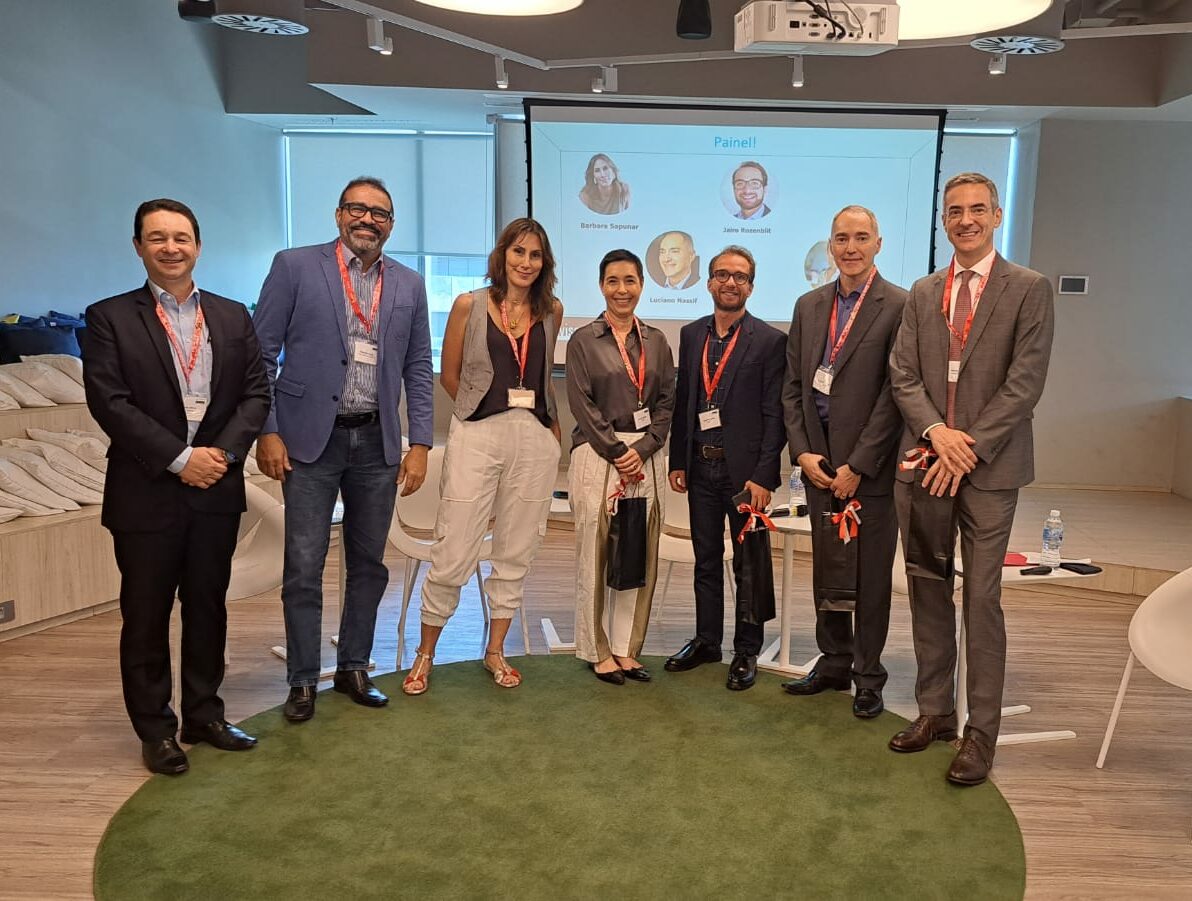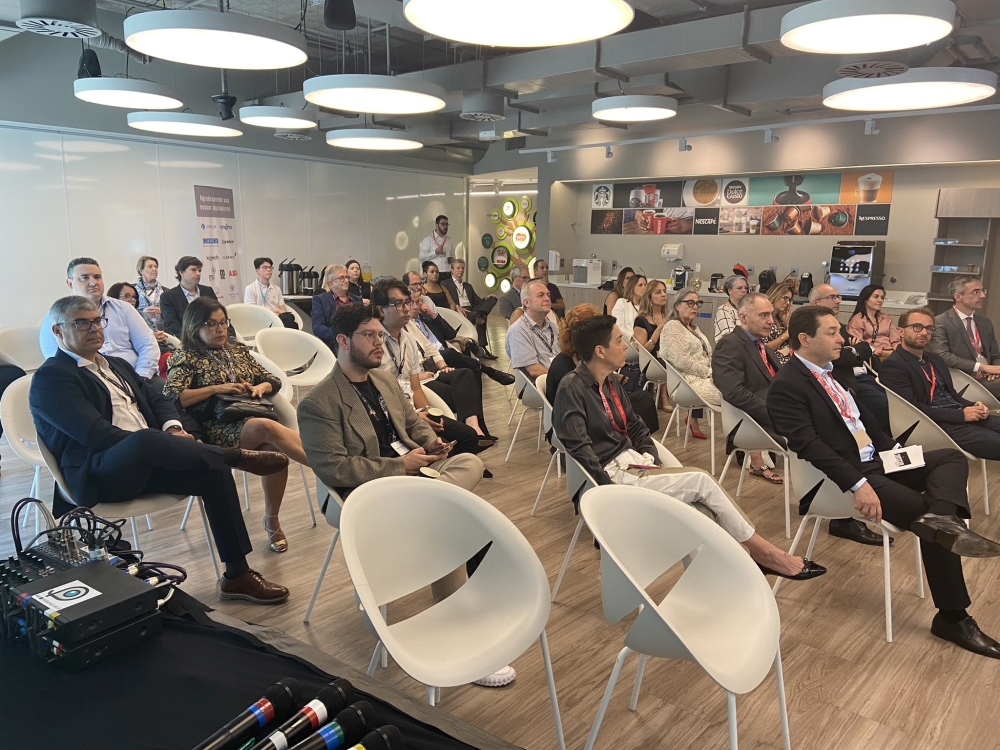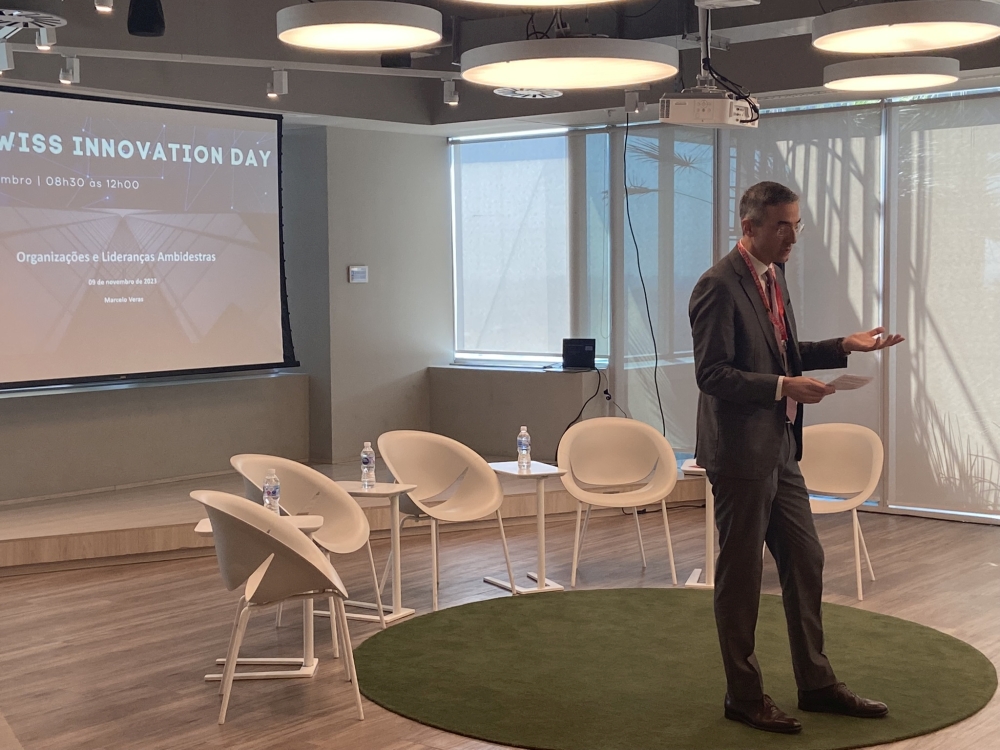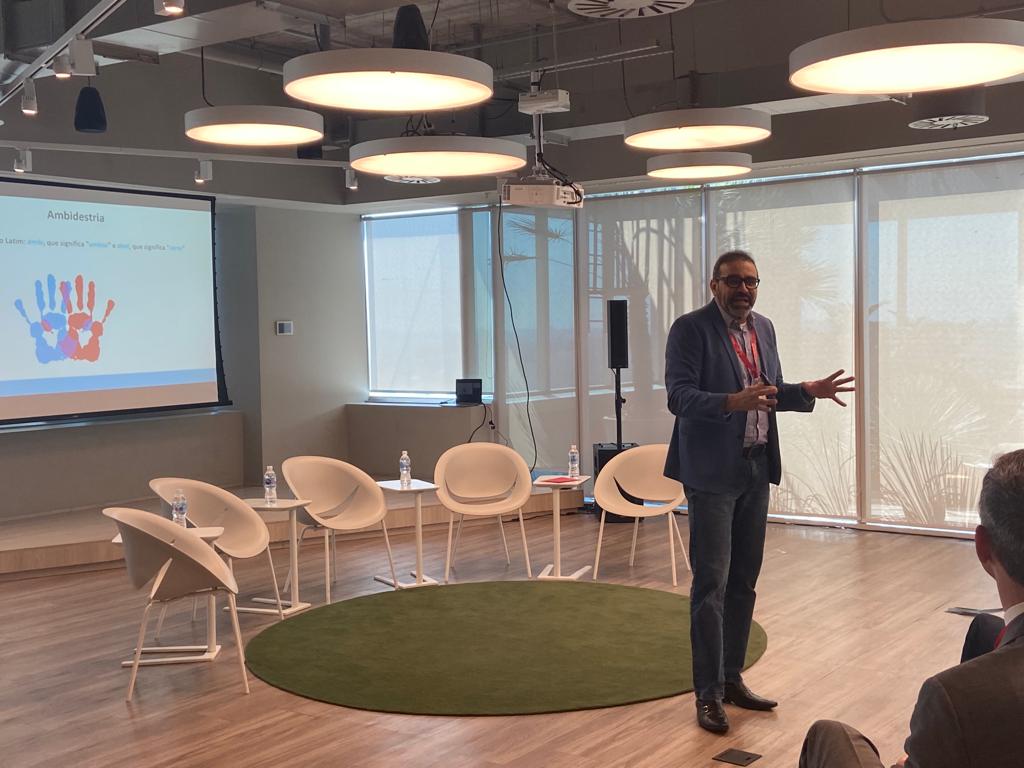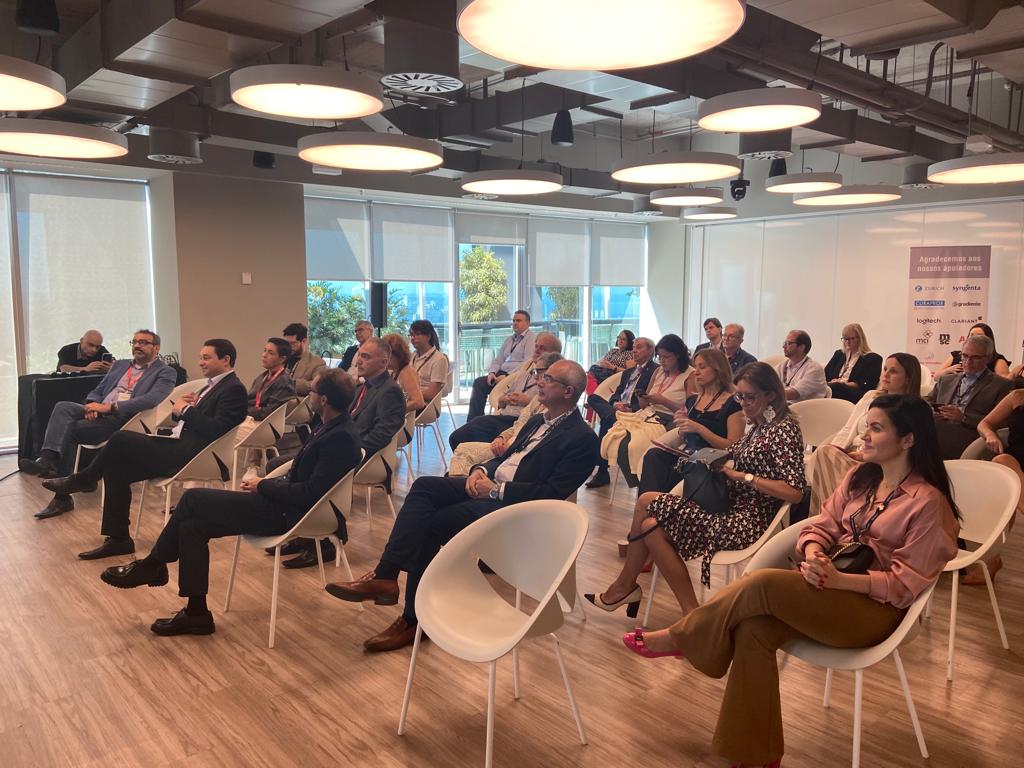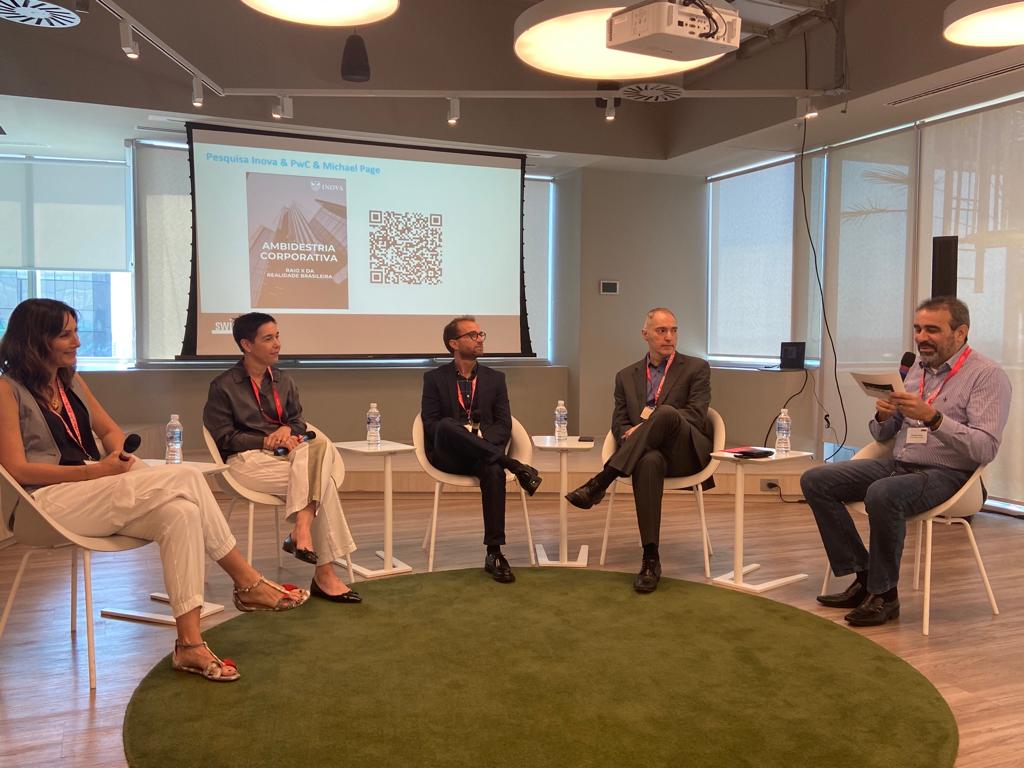On November 9th, 2023, the SWISSCAM Innovation Committee organized Swiss Innovation Day for the third consecutive year in the auditorium kindly provided by Nestlé in São Paulo. The theme of this edition was “Ambidextrous Organizations and Leadership” and featured a high-level program.
The president of SWISSCAM, Flavio Silva, opened the event by welcoming everyone, thanking the Ouro members for their sponsorship and the members who gave souvenirs to the speakers and guests: Caran d’Ache, Curaprox and Lindt. Flavio highlighted the importance of the topic, remembering that everything that brought us here is not what will take us to the future.
Afterwards, he gave the floor to the Consul General of Switzerland in São Paulo, Pierre Hagmann. The consul cited impressive figures about Switzerland’s relationship with innovation. The country has been in 1st place in global innovation rankings over the last few years. More than 70% of Swiss investments in research and development are carried out by the private sector. Switzerland ranks 9th among the largest foreign investors in Brazil, with more than 500 Swiss companies operating here. He also mentioned the importance of innovation in solving global challenges. In this sense, he recalled the Sustainability and Innovation Award, an initiative of the Swiss Embassy in collaboration with SWISSCAM, Swissnex, Ekos Brasil and Swiss Business Hub which, in its first edition, held in Brasília in July this year, awarded sustainable companies and startups , technological and innovative. COP-30 will take place in 2025 in Brazil, in the city of Belém, and will be an excellent opportunity to strengthen the innovation and sustainability agenda. Switzerland recently announced donations to the Amazon Fund.
Following the program, Marcelos Veras, Co-CEO at Ecossistema Inova and coordinator of the SWISSCAM Innovation Committee, gave a lecture on the topic of ambidexterity. Being ambidextrous in management means paying attention to your business, but at the same time keeping an eye on new business.
To explain the concept, he used two metaphors. In the first, the management of a pizzeria was explored and all processes were carried out exactly the same day after day. But if now what got us here doesn’t guarantee the future, we need to get the team together and make space on the agenda to study what customers will want to eat in the future and what to do now so that when orders start to plummet, the business does not close its doors.
The other metaphor is the car on the road that has low beams to see the potholes and high beams to see the cows. If the car drives with low beams all the time, it could hit a cow at some point. If you drive all the time with high beams, you will fall into potholes.
Although some dispute it, there is an almost global consensus that the classic Taylorism school of management is saying goodbye. On the other hand, believing that a methodology can lead to an entirely new management model in a short period of time is a mistake. It is not “one or the other”, but rather “one and the other”. Intelligence lies in the art of knowing how to use what still makes sense in classical school and during the transition period to migrate.
Tunisian philosopher Pierre Lévy points out a way: activate collective intelligence. Nobody knows everything, everyone knows something. Everyone in the company, with a share of their time, energy and knowledge, will help build the future.
Marcelo cited cases of companies that created structural and contextual ambidexterity projects. Find out more about the topic here. As for ambidextrous leaders, they are those who have an eye on the future, a passion for the context and the customer (and no longer for the product and business model) and who study. He cited CEOs who regularly set aside space in their schedule to study. It is necessary to unlearn, overcome emotional attachment to the past, acquire knowledge, have a long-term vision.
After the talk, Marcelo started to moderate the panel that included the following guests: Barbara Sapunar, Executive Director of Business Transformation at Nestlé; Lorice Scalise, CEO of Roche; Jairo Rozenblit, CEO of Logitech; and Luciano Nassif, CEO of ABB.
Each one exposed the reality and challenges in their respective sectors.
Nestlé: the biggest challenge today for the food sector is basically what will be done to feed 10 billion people in 2050. Barbara cited the climate crisis, which directly impacts food production. Facing and rethinking the business to be generative and generate value in the chain demands a systemic look. She cited some of the ingredients with the greatest environmental footprint: milk, coffee and cocoa. Food packaging also requires attention.
Roche: Although many say that the world’s healthcare system is broken, Lorice is of the opinion that it is poorly managed. The health theme is central. If we think about the lack of any of the following factors, health will be compromised: adequate nutrition, education, sanitation, public transport policy and so on. The sector is extremely challenging due to its complexity, including social impacts of problems such as depression, mental illness, drugs, abuse, etc. Currently there is a restricted view of health. He believes that there should be a broader discussion between institutions, as well as an intersectoral dialogue between industries.
Logitech: the sector’s challenges were discussed by the company years ago when they thought: what will become of a computer accessories company if the computer is going to be replaced by cell phones/tablets? The answer was diversification. Jairo cited the successful entry into the games market, which is larger than the music and film industries combined. In addition, they also started to work with B2B videoconferencing systems and in the streaming market. Logitech wants to facilitate interaction between computers and humans and follows the rapid changes in this market.
ABB: Luciano mentioned the company’s commitment to helping customers with sustainability challenges, thinking about how to make energy consumption and operations productivity more efficient, in addition to preserving natural resources. All of this associated with an energy transition and decarbonization of the planet. ABB sees the green hydrogen market as having tremendous potential in the country and participates, together with other entities, in feasibility studies for the development of this industry. They also work to boost the use of electric cars. To demonstrate the great challenges in the area of infrastructure, Luciano recalled that 100 million people in Brazil do not have a sewage network and 35 million do not have access to drinking water. It is estimated that around 4 billion dollars of investment will be needed per year to meet this demand, and this will only happen through partnerships with the private sector. For this, technology will be fundamental. Another major challenge is cybercrime, which causes trillions of dollars of damage worldwide every year.
Next, the panelists mentioned the ambidexterity initiatives they have within the company, both in product/service innovation and management innovation, and the discussion was open to answer the participants’ questions.
We would like to thank everyone present for the enriching exchange in yet another memorable SWISSCAM event.

